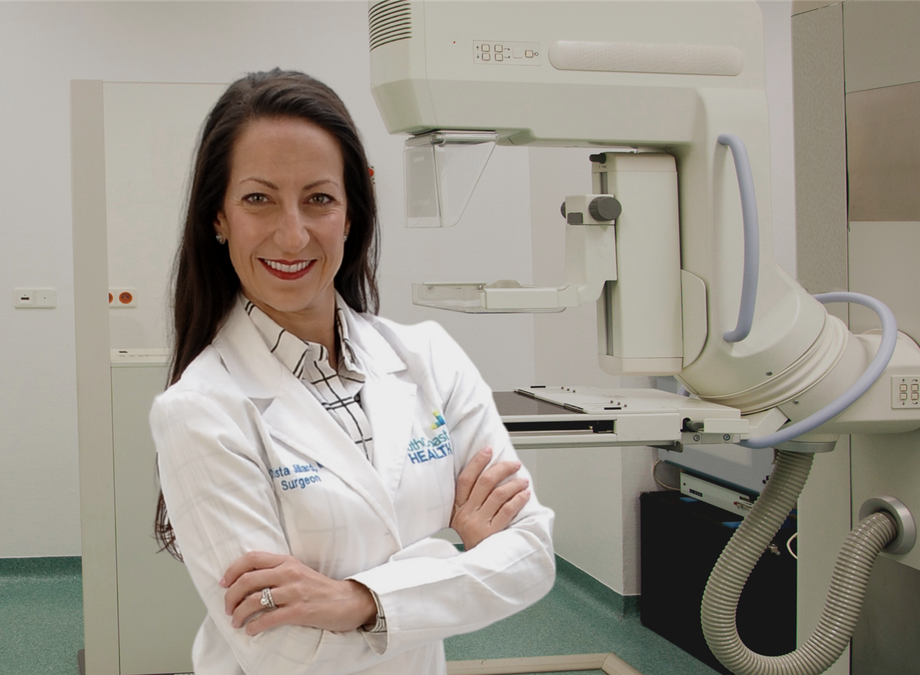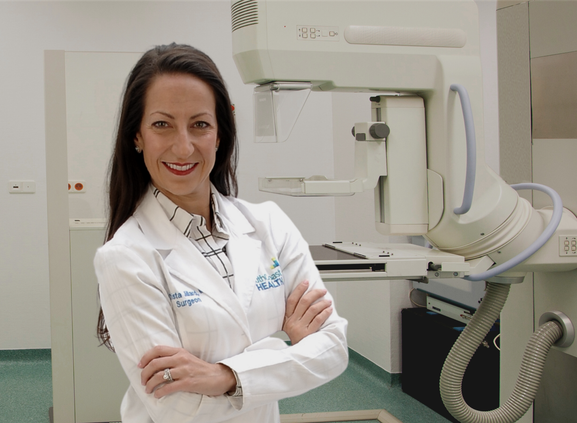SouthCoast Health’s Dr. Christa L. Jillard is a general surgeon by trade but she also took a coveted route in the medical field by completing an Endocrine and Breast Fellowship at the renowned Duke University Medical Center. This world-class training enabled her to be at the forefront of research and development in endocrine and breast surgery.
Dr. Jillard also received the Hidden Scar Certificate of Training from Invuity, a surgical device manufacturer, making her the first surgeon in Savannah to perform this advanced approach to breast cancer surgery that hides scars. Not only active with the American Society of Endocrine Surgeons and the American Society of Breast Surgeons, Dr. Jillard also authored a chapter in a medical textbook, performed multiple research studies, and presented them on the national level.
As part of Breast Cancer Awareness Month, we sit down with Dr. Jillard for a Q&A.
Q. At what age did you first realize that you wanted to be a doctor?
A. Probably around 8 years old. I thought I wanted to be a pediatrician actually, so it’s been quite the journey now that I’m a surgeon.
Q. Was there a defining moment when you realized that you wanted to become a breast surgeon?
A. In residency in particular, I felt I had an ability as a female surgeon to be able to connect with my female patients differently than my male counterparts. Being a breast surgeon also allows me to be more than just a surgical technician. Breast cancer is so much more than just doing breast surgery. There is a lot of time spent in consultation and walking patients through difficult decisions. I also work closely with other cancer doctors; medical and radiation oncologists. We have intellectual discussions, review research findings, and collaborate on treatment plans for our patients. This multidisciplinary approach is very invaluable.
Q. After arriving at SouthCoast Health in 2015, you helped to found the High-Risk Breast Cancer Clinic, the first of its kind in the Lowcountry and Coastal Empire. How serious was the need for this clinic and what services does it provide?
A. Six years ago Savannah did not have a high-risk breast cancer clinic; now, there are three. This demonstrates just how large a void originally existed in serving this patient population. Additionally, the National Accreditation Program for Breast Centers requires cancer risk assessments and genetic counseling as appropriate, in order for breast centers to receive their accreditation. That further supports just how important this is for women’s care. I’m very proud of what we have been able to establish here in Savannah, the domino effect of awareness it has had on the medical community, and of course the specialized care we provide for our patients.
Q. What factors are considered when determining if someone is at high risk for breast cancer?
A. A patient who is identified as high risk is someone who has a greater than 20 percent lifetime risk of developing breast cancer, in comparison to the average 12 percent risk. These patients largely either have a genetic mutation in their DNA and/or have familial factors passed through the family that accounts for the increased risk. Additional risk factors such as age, estrogen circulation, obesity, and hormone replacement use, are also considered. Genetic analysis is performed when indicated, and we run statistical models to identify who falls into this group.
Q. Does being identified as a high risk for developing breast cancer mean that one is certain to be diagnosed with it?
A. Absolutely not, and I always stress this to my patients. Being identified as high risk allows a female to be proactive in her breast care and to take advantage of the preventative measures that are available. Increased radiology surveillance (mammograms and MRIs), medications to decrease estrogen circulation, and even surgical interventions are options that each high-risk patient can consider.
Q. What is prophylactic surgery and what type of patient might be a good candidate for it?
A. Prophylactic breast surgery refers to bilateral mastectomy or removal of nearly all the tissue under the skin from both breasts. Plastic surgery reconstruction is always presented as an option as well. Both interventions are covered by insurance. This surgery is most often pursued by women who have a genetic mutation and a calculated lifetime risk of 50-80 percent. However, this option is available to all high-risk women. In consultation, my job is to educate women on the options available to them, and in turn, empower women to make their own choice on how to mitigate risk.
Q. If someone would like to schedule an appointment at the High-Risk Breast Cancer Clinic, what type of referral would they need, if any, and do they have to be up-to-date on their breast cancer screenings?
A. The referral should come from her primary care provider or Ob-Gyn. It is extremely important to be current on cancer screenings; but I also see women who are younger than 40 years of age, in which case this would not apply.
Q. What advice do you have for patients who are putting off getting their breast cancer screenings due to COVID-19?
A. As I said in 2020, breast cancer does not stop for COVID-19. There is no substitute for taking ownership of your healthcare. Get vaccinated, schedule your mammogram, and see your doctor to address concerns. Ultimately, it is your life alone that could be on the line.
For more information about the High-Risk Breast Cancer Clinic please visit https://www.southcoasthealth.com/highriskbreastcancerclinic.

